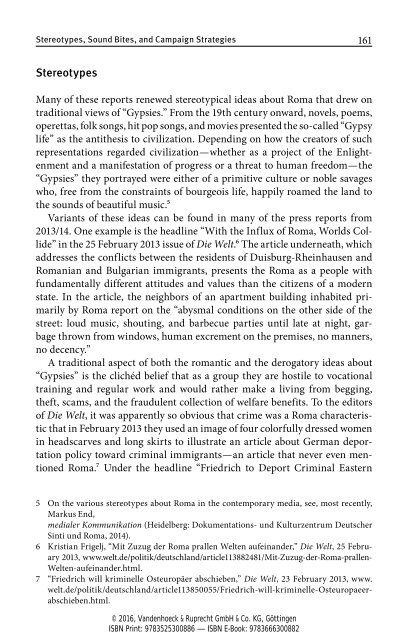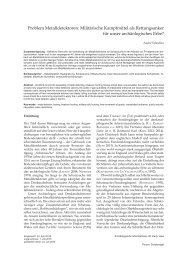Media and Minorities
9783666300882_ruhrmann_media_ebook_034247
9783666300882_ruhrmann_media_ebook_034247
Create successful ePaper yourself
Turn your PDF publications into a flip-book with our unique Google optimized e-Paper software.
Stereotypes, Sound Bites, <strong>and</strong> Campaign Strategies 161<br />
Stereotypes<br />
Many of these reports renewed stereotypical ideas about Roma that drew on<br />
traditional views of “Gypsies.” From the 19th century onward, novels, poems,<br />
operettas, folk songs, hit pop songs, <strong>and</strong> movies presented the so-called “Gypsy<br />
life” as the antithesis to civilization. Depending on how the creators of such<br />
representations regarded civilization — whether as a project of the Enlightenment<br />
<strong>and</strong> a manifestation of progress or a threat to human freedom — the<br />
“Gypsies” they portrayed were either of a primitive culture or noble savages<br />
who, free from the constraints of bourgeois life, happily roamed the l<strong>and</strong> to<br />
the sounds of beautiful music.5<br />
Variants of these ideas can be found in many of the press reports from<br />
2013/14. One example is the headline “With the Influx of Roma, Worlds Collide”<br />
in the 25 February 2013 issue of Die Welt.6 The article underneath, which<br />
addresses the conflicts between the residents of Duisburg- Rheinhausen <strong>and</strong><br />
Romanian <strong>and</strong> Bulgarian immigrants, presents the Roma as a people with<br />
fundamentally different attitudes <strong>and</strong> values than the citizens of a modern<br />
state. In the article, the neighbors of an apartment building inhabited primarily<br />
by Roma report on the “abysmal conditions on the other side of the<br />
street: loud music, shouting, <strong>and</strong> barbecue parties until late at night, garbage<br />
thrown from windows, human excrement on the premises, no manners,<br />
no decency.”<br />
A traditional aspect of both the romantic <strong>and</strong> the derogatory ideas about<br />
“Gypsies” is the clichéd belief that as a group they are hostile to vocational<br />
training <strong>and</strong> regular work <strong>and</strong> would rather make a living from begging,<br />
theft, scams, <strong>and</strong> the fraudulent collection of welfare benefits. To the editors<br />
of Die Welt, it was apparently so obvious that crime was a Roma characteristic<br />
that in February 2013 they used an image of four colorfully dressed women<br />
in headscarves <strong>and</strong> long skirts to illustrate an article about German deportation<br />
policy toward criminal immigrants — an article that never even mentioned<br />
Roma.7 Under the headline “Friedrich to Deport Criminal Eastern<br />
5 On the various stereotypes about Roma in the contemporary media, see, most recently,<br />
Markus End,<br />
medialer Kommunikation (Heidelberg: Dokumentations- und Kulturzentrum Deutscher<br />
Sinti und Roma, 2014).<br />
6 Kristian Frigelj, “Mit Zuzug der Roma prallen Welten aufein<strong>and</strong>er,” Die Welt, 25 February<br />
2013, www.welt.de/politik/deutschl<strong>and</strong>/article113882481/Mit-Zuzug-der-Roma-prallen-<br />
Welten-aufein<strong>and</strong>er.html.<br />
7 “Friedrich will kriminelle Osteuropäer abschieben,” Die Welt, 23 February 2013, www.<br />
welt.de/politik/deutschl<strong>and</strong>/article113850055/Friedrich-will-kriminelle-Osteuropaeerabschieben.html.<br />
© 2016, V<strong>and</strong>enhoeck & Ruprecht GmbH & Co. KG, Göttingen<br />
ISBN Print: 9783525300886 — ISBN E-Book: 9783666300882







